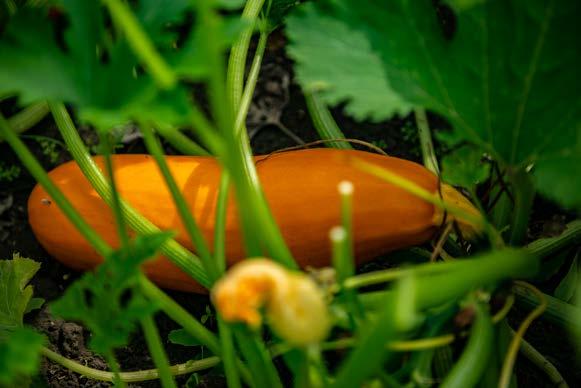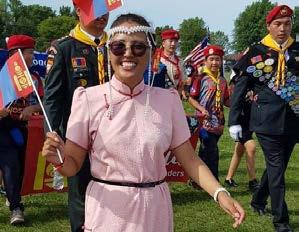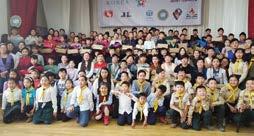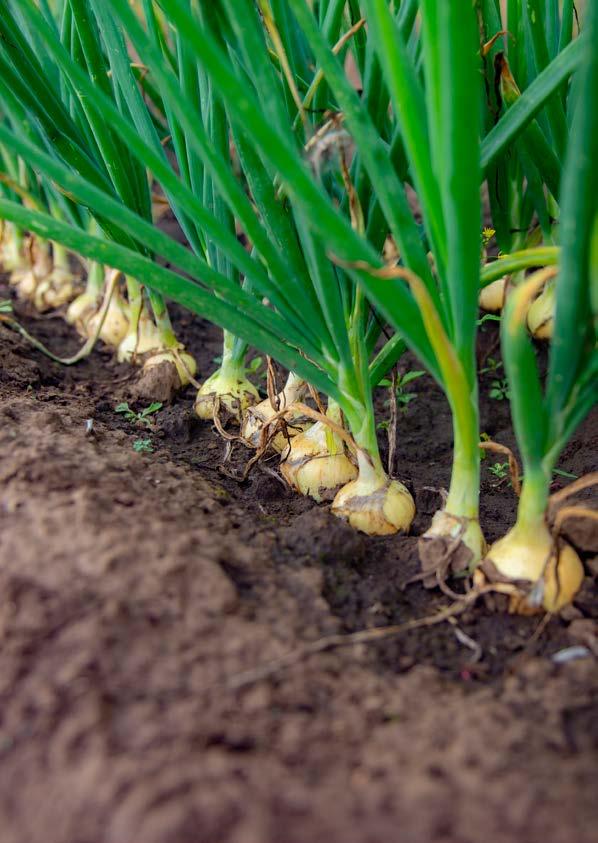Fine wool pilot project / on page 14









Since June 1, 2022 - we are on our fourth month of the implementation of our five-year Strategic Plan (SP). As we inch into the new fiscal year of 2023, we would like to share the highlights on the ongoing activities reflected on our SP document: • Adra mongolia board members’ education on development practice and training • Strengthening the partnership with the sda church
Development of new partnerships within the adra network
Development of new partnerships outside of adra network • Increase in funding opportunities through networking and collaboration

Progress on the organizational structure • Social enterprise • Lessons learnt workshop
NOTE: In 2022, ADRA Mongolia has been actively engaged in cluster meetings and has represented in international organization meetings and fora under the leadership of the Mongolian government and the UN Resident Coordinator’s office in Ulaanbaatar. Cluster meetings are being held through the Humanitarian Country Team (HCTs) to strengthen the coordination among organizations (both international and INGOs) in proactively responding to any disaster or emergency situations.

Sustainable Agriculture, Food and Economics Resilience-2 (SAFER-2) Project


Donors: Canadian Food Grains Bank (CFGB), ADRA Canada, ADRA China-HongKong, ADRA Netherlands
Budget: 376,289.87 USD
Duration: 3 years (2020-2023)
Key focus area: Ulgii, Bugat and Sagsai Districts of Bayan- Ulgii Province
Beneficiary Partners: 845 households (3718 individuals)
Pasture Land-Use It Sustainably (PLUS) Project
Donors: ADRA Switzerland, Zurich & Aargau provinces
Budget: 292,933 USD
Duration: 2.6 years (2021-2023)
Key focus area: Pasture User Groups (PUGs) in Ider District of Zavkhan Province
Beneficiary Partners: 100 herder households (440 individuals)
Fine Wool Sheep Breeding
Donors: Help International/ADRA
Budget: 100.000 USD Duration: 1 year ( July
Key focus area: Darkhan-Uul
Beneficiary Partners:
International/ADRA
USD July 2022- July2023)
Darkhan-Uul Province Partners: 100 herders


Donors: ADRA Germany, BMZ Budget: 1,264,921.75 USD Duration: 4 years (2018-2022) Key focus area: 11 Districts in Selenge Province Beneficiary Partners: 31 cooperatives 928 members (4083 individuals)
Donors: ADRA Mongolia staff, family members/private donors Budget: 4,072USD Duration: 1 month Key focus area: Bayanzurkh, Bayangol, Khan-Uul, and Songinokhairkhan District of Ulaanbaatar Beneficiary Partners: 150 households (490 individuals)







• Functioning inter-institutional Multi-Actor Partnership (MAP) dialogue structures with the participation of representative groups of actors at the local and national levels that facilitate the cooperation necessary for strengthening organic agriculture.

• The productivity capacity of 30 cooperatives are sustainably diversified and increased.


• Profitability: Increased access of 30 cooperatives to local and regional markets through MAP platform and value-chain development
Highlights:
• A total of 1,941 beneficiary partners which is composed of cooperative members and selected government officers attended 13 different trainings in organic agriculture, cooperative governance and management, and business training/s. In addition, there were three international conferences held virtually that provided the POAg team added skills and trainings as part of their capacity-building activity.
• There were 15 organizations established using the Participatory Guarantee System (PGS) in 11 districts in Selenge province. Activities include the formulation of PGS internal bylaws, developing peer-review inspection documents, and using the traceability books of organic farmers and bee-keepers. Currently, there are 220 cooperative members are involved in the internal peer review and duly registered in the national government’s organic registration system.
• In 2021, the project’s beneficiary partners (organic farmers and bee-keepers) managed to grow 31 kinds of organic vegetables in 223 hectares and harvested a total of 2,440 tons and 2,770 tons of organic honey with total amount of 2-billion MNT (701,754USD).

Training: In 2022, 722 (F579/M143) cooperative members involved in the Organic agriculture, Participatory guarantee system, Organic food processing standard, Farmers field school and cooperative governance and management, business training. Cooperative members, government officers involved in the 9 different training.



Currently 16 Participatory Guarantee organization were established in 11 soums(villages). PGO internal bylaws, peer review inspection documents and traceability books of organic farmers and beekeepers were developed by project core team. Since the project start, 347 farmers took pledge to shift from conventional to organic agriculture. By the end of September of the year 347 small farmers and beekeepers are members of the participatory guarantee organizations. 265 coop members were involved in the internal peer review and registered in the government organic registration system. These farmers and beekeepers enabled to use conversion and organic food logos for their 1010 vegetable, honey and organic compost by the end of September 2022.
Organic harvest 2022: As a result of the cooperative members’ hard work and on-going technical support of the project team, farmers and beekeepers have grown 35 kinds of vegetable for 245,3 ha land in 2022. We are expecting to harvest 3500 tons of organic vegetable and 5 tons of organic honey in 2022. Primary cooperatives supply organic vegetable, honey and compost to Cooperative Union under contract. By the end of the September, 2022 Cooperative Union sold 106 million MNT organic product under Selenge Organic branding.

Off-season income generation: Seasonality of agricultural income is one of the biggest challenges in terms of engaging people in agricultural sector. In collaboration with Selenge Tavan Khairkhan Cooperative Union project provided cooperatives with small-scale equipment for starting off-season business activities based on their needs and business plan. Also, related vocational training for off-season business activities were conducted in previous years. In 2022, 32 small workshops such as bakery, sewing and dairy products, organic fertilizers, felt products, drying & pickling vegetable have been operating in 11 soums. 2 primary cooperatives produce 150 tons certified organic fertilizer each year. To increase the value-added organic products, the project promotes the cooperatives to develop products and its packaging and labels.

ADRA Mongolia in cooperation with the National Livestock Gene Bank (NLGB) under the Ministry of Food, Agriculture and Light Industry (MOFALI) and the Research Institute of Animal Husbandry (RIAH), has started to implement the 18-month (1st phase) of the Fine Wool Sheep Breeding Project last June 2022. On 1st November, the Memorandum of Understanding (MoU) has been signed between ADRA Mongolia ,NLGB, RIAH, Orkhon Sheep LLC, and Orkhon soum (district) local government. Those present during the signing were: Brendon Irvine, ADRA Asia Programs and Planning Director; Windell Maranan, ADRA Mongolia Country Director; S. Zoljargal , ADRA Mongolia Programs Coordinator; Mr Gankhuyag, Director for NLGB under MOFALI ; Dr Myagmarsuren Purevdorj, Scientific Secretary of RIAH; Dr Amar of Orkhon Sheep LLC and Governor G. Bat-Orkhon of Orkhon soum (district) and other related officials. As well, the activity was highlighted by conducting theoretical and practical training on laparoscopic artificial insemination (AI) of deep-frozen semen by Australian veterinary specialist, Dr. Greg McCann with Mongolian veterinarians of NLGB and RIAH. The said initiative was able to accomplish laparoscopic AIs to 300 ewes (female sheep) out of the imported 5,000 frozen semen from the top one percent of very high genetic merit Merino rams from Australia. The overall goal of the pilot project is to assist in the revival of fine wool flocks in Mongolia.



More so, on 03 November, Mr. Dave Preston, First Secretary of the Australian Embassy; along with his wife and Mrs. L. Enkhtuvshin, Country Program Manager for Australia Awards; visited the National Livestock Gene Bank for the project activities. The pilot project is made possible through a funding grant by HELP International in partnership with ADRA Asia.

ADRA

lives with her husband and children in Ider soum (district) of Zavkhan aimag (province). Her day starts with milking yaks early in the morning and processing dairy products for her household’s use. She is an active person who always attends meetings and community events organized by soum (district) governments and other organizations for self-development.

As a female herder of Darkhan – Uul Bagh, Erdenesuvd has experienced considerable results even though she had not expected much from the implementation of the Summer Grazing Plan. She developed it with her herder neighbors in May 2022 when Mr. Nick Sharpe, the Savory Institute expert, conducted an onsite training in Holistic Management for herders in Ider soum. “I have been a herder for my whole adult life and thought that I knew everything about pasture management but I was wrong. The Pasture Land Use It Sustainably Project changed all of that. Based on the grazing plan, putting the livestock together in the paddock (areas of hills, rivers and valleys that are not fenced) in a rotational way with scheduled plant recovery times, we have seen good growth of grasses and better soil conditions during this season even though there has been a very dry summer and even drought. It has been amazing,” said Erdenesuvd.

Since November 2021, D. Erdenesuvd has regu-

larly participated in the Holistic Management online and onsite trainings and planning meetings facilitated by the Savory Institute, based in the US. “Most importantly, I learned a lot of new and refreshing knowledge from the Savory Institute experts. I have realized that it is completely possible to restore pasture land regardless of the number of livestock by planning grazing of the summer pastures in a way that ensures recovery times for plants and grasses to adequately grow. I now understand the need and the role of livestock grazing for landscape nutrient cycles,” she continued. “Realizing that it is possible for us as herders to work together for better pasture land use through holistic management methods, my neighboring herders namely Ms. Bolortsetseg, Yanjmaa, Davaasuren, and Elbegjargal and I are now very happy and ready to receive the coming autumn and winter with good recovered pasture through successfully coping with the dry summer and drought based on the joint summer grazing plan. We really encourage other herders to work together to develop grazing pasture plans through holistic management approaches for pasture land recovery.”



 (DISTRICT), by NICHOLAS SHARPE
(DISTRICT), by NICHOLAS SHARPE
The project “PLUS – Pasture Land – Use it Sustainably” is a multipartner initiative led by ADRA Mongolia and the Savory Institute. It seeks to address the deterioration of pastures due to overgrazing by introducing and consolidating the use and understanding of Holistic Planned Grazing among the herders and communities of the Ider Soum in Mongolia.

Activities of the PLUS project have included various online and in-person training events for the Ider herder community and national actors, Ecological monitoring using Savory’s EOV methodology to establish baselines, work with the Ider Milk Programme and other support activities, with the aim of helping Ider communities and herders to incorporate regenerative grazing approaches and holistic decision-making into their daily lives.’
It is the only way found to showcase a managed grassland area in the current cultural context; a large number of grazers acting as independent decision makers sharing common grazing lands, increased stocking rates, increased pasture deterioration, climate change and an increasing difficulty in establishing policy and governance when conflicts arise because of this. Therefore, the fencing off of these enclosures is meant to be a learning tool that affects only a small area of your current grazing lands (each less than 1ha), yet provides an important perspective on Holistic Planned Grazing as a tool for improved
grassland health and productivity. Holistic Planned Grazing––one of the planning procedures of Holistic Management––is the practice of planning and charting grazing moves considering the current context and respecting the time that a plant is exposed to a grazing animal and planning enough time for plant to recover before being grazed again.
Holistic Planned Grazing will be applied to the grassland within the fenced area to obtain the following objectives:
● Showcase the capacity of Holistic Planned Grazing to increase fodder quality and quantity under local conditions preventing the animals from having to be moved pre maturely on to land that has to be reserved for more critical periods.
● Provide a planning tool for forage calculations if HM were applied to larger areas, so as to compare with current stocking rates, management approaches and resulting productivity.
● Allow for better understanding of how the community dynamics (combination of plant species and life at soil level) react when the recovery periods of key plant species are respected and how they then respond to controlled grazing. Grazing of the fenced areas will be determined by the Savory Institute’s Field Professionals and will take place according to the approved Grazing Planning and Control charts, until the community understands the concepts and shows capacity to apply them independently and in a coordinated manner.
This fencing exercise is in no means a justification for private land tenure policies or promotion of permanent fencing as a management tool. Saying this we understand that Shared Problems (land degradation) need Shared Solutions, and this needs a Shared Vision, a Shared Plan and Governance.
Permanent fencing infrastructure was established under the PLUS project as a transitional tool that has been found to fit with the various options available and the holistic contexts of the Soum decision-makers and project partners for this specific stage of the project. Other management tools and approaches for controlling livestock grazing should also be considered and tested against the community’s Holistic Context, including herding and traditional management approaches that allow for plant recovery time.
Following the onsite visit and training event held in May 2022 by Savory Institute staff, the Pasture Land – Use it Sustainably (PLUS) Project in Ider soum (district) of Zavkhan aimag (province) together with the Ider Government decided to enclose with a fence a total of 3.5-hectare areas of pastureland in 4 baghs (subdistricts): 1 ha in Darkhan-Uul, 1 ha in Manuustai, 1 ha in Zagastai and 0.5 ha in Tsetserlag baghs was fenced in cooperation with the soum governments. The fenced areas will act as a test site for showcasing the importance of grass recovery times and as a reference area for the wider bagh.


Nutgiin Us Cooperative which was established in 2015 in Sagsai District of Bayan-Olgii Province with the support of the Sustainable Agriculture, Food & Economics Resilience II (SAFER 2) Project of ADRA Mongolia, has been successfully operating for the 7th year. The cooperative is working hard to improve food security and increase the income of member families by growing potatoes and vegetables. In 2022, they have planted potatoes on 1 hectare of land, and other types of vegetables such as carrots, beets, cabbage, broccoli, onions, garlic, lettuce, and dill on another half hectare.


Also, 2 summer greenhouses: one of which is 6x10 meters in size and the 6x20 meters in size extended duration “sunny” one; were used to grow cucumbers, tomatoes, and sweet peppers. 50 trucks of manure were mixed into the soil, after which the members of the cooperative plowed the land and planted potatoes and vegetables. “Even though the harvest may not be abundant this year, we are happy to harvest potatoes and vegetables for our own consumption,” they said.

Difficulties also occurred during the operation. “This year, there was not much rain and summer was very dry; there was a lack of water and it was difficult to cultivate the soil manually due to the lack of equipment,” said the head of the cooperative, B. Saulet. Despite the difficulties, as a result of the hard work of the members of the cooperative, they were able to harvest 5 tons of potatoes, 0.3 tons of carrots, 0.15 tons of beets, 0.1 tons of cabbage, 0.1 tons of broccoli, 0.2 tons of onions, garlic, and lettuce.
Cucumbers, tomatoes, and peppers were grown in 3 other greenhouses and they harvested 800 kg of cucumbers, 60 kg of tomatoes, and 40 kg of sweet peppers.


The SAFER 2 Project is funded by Canadian Foodgrains Bank through partnership with ADRA Canada.


During the recently concluded “6th National Organic Conference” organized by The Ministry of Food, Agriculture and Light Industry (MOFALI), Food and Agriculture Organization (FAO) of the United Nations, the office of Parliament member Ch.Undram and ADRA Mongolia; the Draft Amendment Law to the Organic Food Law of Mongolia initiated by the Parliament members Ch.Undram, T.Enkhtuvshin and T.Aubakir was presented to the different stakeholders. The Draft contains the following support to organic producers:

• Covering the certification costs to transition from conventional to organic production and the purchasing cost of domestically produced organic compost and fertilizers in the first 3 years
• Development of organic gardens in preschools an general educational schools.
• Bank interest support for at least 50% of loans taken from commercial banks if producers export their organic products.
• One-time support of up to 75% of costs from the state budget invested in research and development and a producer supplies a new type of organic product to the public by introducing advanced methods and technology.

• 90% of income tax reduction only on in come earned from organic products.
• Exemption from value-added tax of mar keters and sellers of organic products and other necessary tax incentives and exemptions as necessary.

A total of 6,250 pieces of good quality protective clothings or PPEs donated by a businesswoman from South Korea were turned over today to different agencies and other stakeholders that ADRA Mongolia is collaborating with. The distribution is made possible through the cooperation between ADRA Mongolia, ADRA Korea and the Mongolia Mission of Seventh-day Adventists.



The In-Their-Shoes Project provides food packs and shoes to 100 families and 50 children; of single-headed households, including persons with disabilities.

In the beginning of 2021, ADRA Mongolia developed the In-Their-Shoes project with the theme of Love Wins! that will cater to the needs of the most vulnerable of the communities, namely: people with disabilities, single-headed households and persons with limited income.


The project was made possible through voluntary monthly contributions of ADRA Mongolia staff and donations from some family members who have the same passion for helping those who are in need. The assessment and distribution activities were also made possible through the combined efforts of the different district offices in the four distribution sites and ADRA Mongolia.
As part of our project, we all feel that giving is more blessed than receiving, and spreading God’s love to others is happiness in itself. We sincerely appreciated the employees of our organization who participated in this project and we are grateful to the employees of our working committees. We will continue to implement this project every year.


13 ADRA country offices from the Asia region participate in the 5-day Communications Workshop hosted by ADRA Asia Regional Office, from 14-18 Nov. 2022 in Bangkok, Thailand. This was amazing training for the future of ADRA Asia.


Bolormaa /Bona/ is an accountant/procurement officer and joined ADRA Mongolia in 2014. She is an Adventist woman, mother of 4 children and the Master Guide of Pathfinder club in Mongolia.

The mission of great commandment motivates me to work in ADRA Mongolia. Previous Finance Director Jorge Silva once told me ‘You are not only an accountant here but a missionary in ADRA Mongolia. Don’t forget your mission. I keep this motivation in my mind always.
I am working as an accountant and procurement officer. What I most love about my position is having a chance to extend my experience in many different areas such as agriculture, and product development when I do procurements related to the projects. Also, it is a blessing to see how God guides me in my workplace.
Surely, there are a lot of unforgettable memories. One of them was to lead and implement the project named ‘Warm shoes – Happy kids’ to distribute winter boots for 110 disabled children of special school#29 in Ulaanbaatar, Mongolia in 2018 with the cooperation of 3 Pathfinder Club children. At that moment, I understood how is meaningful to live to give to others. I could see there were interconnections through their eye contact between Pathfinders and the children who are mostly unable to talk and listen. Before the project implementation/distribution day, the pathfinders had an honor class in sign language to learn how to communicate with disabled people and prepared some gospel songs with a motion for the children. During the distribution, the pathfinders sang for the beneficiary children meantime the of the disabled children sang the song about mothers’ love with sign language, and this song touched every person’s place we were in, heart deeply and many of us had tears in our eyes. That time was memorable for me indeed.

The work of ADRA is the mission field to reach out the FORGETTEN ones in last days as same what Dorcas did. Also I believe that it is God’s will to allow me to be here for such a time as this.

